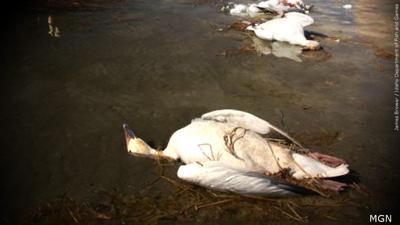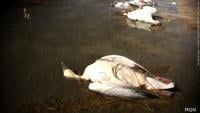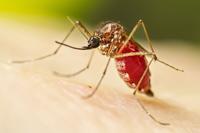WSIL -- Wildlife biologists in Illinois and Missouri are encouraging the public, including hunters, to keep close watch for dead waterfowl as potential avian influenza outbreaks effect wild ducks and geese.
Avian influenza, or “bird flu,� is a respiratory disease of birds caused by influenza A viruses. Wild birds, such as ducks, gulls, and shorebirds, can carry and spread these viruses but may show no signs of illness. However, avian
influenza can kill wild birds and domestic poultry (such as chickens,
turkeys, ducks, and geese).
Avian influenza spreads quickly through direct, bird-to-bird contact. It can also spread to birds via contaminated surfaces and materials, including people’s clothing, shoes, or hands.
According to the Illinois Department of Natural Resources (IDNR), more than 300 waterbirds, primarily snow geese, have died of suspected avian bird flu at public hunting areas in southern Illinois.
The deceased wild birds have been found at Baldwin Lake, Pyramid State Recreation Area, Rend Lake, and Carlyle Lake in recent days.
IDNR is asking the public to (20 or more) of deceased birds found at any location.
IDNR and the Illinois Department of Agriculture first announced the detection of avian influenza in March 2022 when it was found in wild Canada geese.
Illinois is not alone, Missouri has also seen recent cases of avian bird flu in waterfowl.
“We have seen an uptick in avian flu in the last two weeks", said Sherri Russell, a wildlife veterinarian with the Missouri Department of Conservation (MDC). "We were expecting it. We’re seeing problems in Arkansas, Illinois and Missouri.�
As the birds migrate south this fall and winter, cases in wild ducks and geese were anticipated.
It’s something that organizations like MDC and IDNR are monitoring closely. Thankfully, avian influenza rarely infects people.
“It specifically targets a receptor in birds that is unique to bird lungs," explained Lucas Kirschman, a biologist assistant professor at Southeast Missouri State University. "Mammals, especially humans, do not have that receptor except very deep in the lungs. Birds essentially get the flu the same way a person does, there’s respiratory symptoms.�
This current strain of bird flu has proven to be very contagious. Waterfowl, like snow geese, are at high risk, not only because they're susceptible to the virus, but also because they often congregate in large groups, making transmission more likely.
Domestic birds, mainly poultry, have also experienced outbreaks of avian bird flu.
"This strain is especially virulent to chickens and turkeys," said Kirschman. "Once it gets into a domesticated poultry flock, it spreads very rapidly and is almost universally fatal.�
The public should avoid handling sick or dead waterfowl found in the field, and they should not allow dogs or other pets to consume waterfowl that died from unknown causes. Further guidance for hunters can be found at














